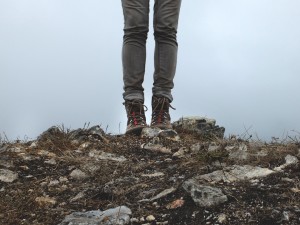Hunters & Hikers Need to be Aware of Their Foot Conditions
 As brightly colored leaves dazzle the fall landscape, hikers and hunters in Northern Michigan will migrate to the woods and fields, but many, unfortunately, are ill prepared for the beating their feet will take.
As brightly colored leaves dazzle the fall landscape, hikers and hunters in Northern Michigan will migrate to the woods and fields, but many, unfortunately, are ill prepared for the beating their feet will take.
Hikers, hunters and others who love the outdoors often don’t realize how strenuous it can be to withstand constant, vigorous walking on uneven terrain. Lax physical conditioning and inappropriate footwear bring scores of outdoor enthusiasts into our office each fall for treatment of foot and ankle problems such as chronic heel pain, ankle sprains, Achilles tendonitis, fungal infections and severe blisters.
Walking up and down steep hillsides and tramping through wet, slippery fields and wooded areas puts stress on the muscles and tendons in the feet and ankles, especially if you haven’t conditioned properly before hitting the trail. Also, many don’t realize that cross-training athletic shoes aren’t the best choice for extended hiking and hunting. Had some of my patients worn sturdy, well constructed hiking boots, they wouldn’t have suffered sprained ankles or strained Achilles tendons.
I advise hikers and hunters to make the investment in top-quality hiking boots. Strong, well insulated and moisture-proof boots with steel or graphite shanks offer excellent ankle and foot support that helps lessen stress and muscle fatigue to reduce injury risk. The supportive shank decreases strain on the arch by allowing the boot to distribute impact as the foot moves forward. So if a boot bends in the middle, don’t buy it.
In wet and cold weather, wearing the right socks can help prevent blisters, fungal infections and frostbite. I recommend synthetic socks as the first layer to keep the feet dry and reduce blister-causing friction. For the second layer, wool socks add warmth, absorb moisture away from the skin, and help make the hiking boot more comfortable. Wool lets moisture evaporate more readily than cotton, so fewer blisters develop.
What happens if your feet or ankles hurt during a hike or hunt? Pain usually occurs from overuse, even from just walking. If you’re not accustomed to walking on sloped or uneven ground, your legs and feet will get tired and cause muscles and tendons to ache. To avoid a serious injury, such as a severe ankle sprain or an Achilles tendon rupture, rest for awhile if you start hurting. Serious injury risk escalates significantly if you continue hiking in pain.
Evaluation is recommended if there is persistent pain following a hiking or hunting outing. I’m most concerned about ankle instability and strained Achilles tendons. Inattention to these problems at their early stages may lead to a serious injury that will keep you off the trails for a long time.
